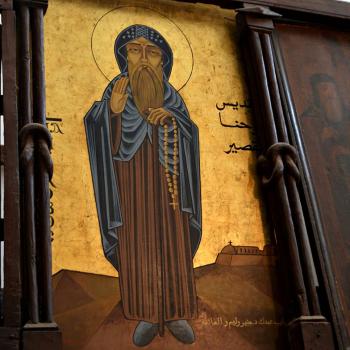
We are to love our neighbors as ourselves. We are to take care of them and their needs, just as we take care of our own. This love should motivate us so that we do not live just for ourselves, but rather, make sure we live for others. We are not meant to be individualists. We will never be holy if we ignore our neighbor. Anyone who suggests we can abandon the world, because we don’t like what is in it, and be all by ourselves, either as individuals, or as small communities which exist in opposition to the rest of the world, lead us astray, as they would have us abandon our neighbor. We must always think of others, and realize our own holiness lies, not being independent from them, but in interdependence with them; what we have should be shared with others, which means, when we find ourselves receiving grace and becoming holy, we should share that grace with others, lifting them up and helping them to become better. Likewise, we will find ourselves being made better when those around us are better. Salvation is communal, which is how and why, when properly interpreted, we can say there is no salvation without the church, because all who are saved will be in communion with each other and united with each other in the body of Christ (of course, we must understand how people are united and connected together in the church is dependent upon Christ, not us, and so, as Jesus hinted in his parables, many who thought they were outside will find themselves already a part of it when he announces their salvation at the last judgment).
Abba Poemen, relating what he had heard from Abba Theonas, likewise indicated how our salvation, how our reception of grace, is connected with our relationship with our neighbor:
He [Poemen] said that Abba Theonas said, ‘Even if a man acquires a virtue, God does not grant him grace for himself alone.’ He knew that he was not faithful in his own labour, but that if he went to his companion, God would be with him.[1]
Theonas learned that the virtues he attained, which of course, were attained in and through his cooperation with grace (and not by himself alone), were not given to him only for his own benefit. That is, he learned that the more he attained some sort of virtue, the more it had to be put to use for the benefit of others and not just his own spiritual development. Theonas, therefore, realized that as long as he labored all by himself, and only for himself, he was not being faithful to God. He was not properly engaging the grace which he had received. For to set himself apart from others was to be selfish. Holiness, however, which is connected with love, can never emerge from such selfishness. Moreover, he came to understand that those who disconnect themselves from their neighbor lose God, who is found in and with their neighbor. Thus, the lesson which he learned, and what we can get out of this story, is that we are not meant to be islands set apart from each other. God is in and with our neighbor, and if we want to encounter God, we can’t dismiss our neighbor. Grace doesn’t come from us, but from God, and so is had when we open ourselves up to our neighbor.
Abba Poemen, continuing along these lines of thought, said that we should make sure we stop thinking about ourselves, and our own wants and desires, for that way we can look to our neighbors, and see what it need, and help them attain it. “He also said, ‘Do not do your own will; you need rather to humble yourself before your brother.’”[2] As we tend to consider ourselves to be greater, more important, than we are, in this fashion, looking to others, bending our will so as to help others with their needs, is indeed an act of humility, for it leads us away from all prideful thoughts which suggest we are entitled to everything we should desire. This, of course, is difficult, if not impossible, for us to do if we abandon our community.
Anyone who would suggest monasticism is about denial of the world for the sake of personal holiness has not studied monastic literature. It is true, many monks wanted to live in solitude, but it is also true, they could never do so absolutely. They always were connected to a greater community and people could, and would, come to visit them for their help and advice. Even in solitude, their focus was not just on themselves, but the good of the world. Their prayers, their actions, their accomplishments were not seen as being done for themselves alone. They were meant to become great intercessors for the world; whatever virtues they attained were seen as bringing more grace to the world. Only those who had proved themselves in a community setting, those who showed they understood spirituality not to be so individualistic, were seen as being ready to be hermits, because then, just as Jesus did not abandon us in his ascension, so they would know not to abandon the world in their hermitage. They were expected to keep the spirit of community alive in their isolation. If they didn’t, then their isolation could, and likely would, cause them more harm than good; spiritual delusion, prelest, is far more common in those who try to do all things by themselves with no direction or input from others than those who stay within a community and allow it to shape and refine them.
The more we grow in holiness, he more we should come to realize that our holiness, and the grace which we cooperate in order to achieve it, is not meant for ourselves alone. If we are to be faithful to the virtue which we have attained, we will share the fruit of that virtue with others. For true holiness is achieved in love, the kind of love revealed to us in Jesus Christ, a love which seeks out those who are lost , not to condemn them, but to lift them up with grace and compassion. So long as we are centered upon ourselves, we will not be faithful to our calling, no matter how much virtue we think we have attained; it will be as nothing, as Paul warned us, because we will be acting out of self-interest and not love.
[1] The Sayings of the Desert Fathers. trans. Benedicta Ward (Kalamazoo, MI: Cistercian Publications, 1984), 188 [Sayings of Abba Poemen 151].
[2] The Sayings of the Desert Fathers, 189 [Sayings of Abba Poemen 158].
Stay in touch! Like A Little Bit of Nothing on Facebook.
If you liked what you read, please consider sharing it with your friends and family!













